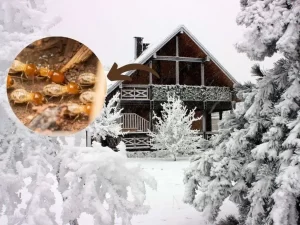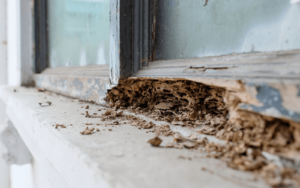Southern California Exterminators
What you need to know about termites in the winter
Contrary to popular belief, termites don't completely shut down during winter.
Are termites active in the winter?
Termite Treatments in the winter is what we do at Southern California Exterminators. A common misconception among homeowners is that termites are only active during hot weather, which is not entirely correct. Although some termite species may perish in winter, many resilient species can withstand low temperatures. Still, termites remain active and destructive to homes in the winter months, underlining the need for constant vigilance to ward off and safeguard your home from possible termite infestations throughout the year.
Termite Inspections in Orange County Are you looking for effective termite and pest control services in Orange County, South/East Los Angeles County, or Corona, CA.? look no further than Southern California Exterminators!
Termites, adept at adapting to various climates, typically don’t succumb to cold weather alone. In lower temperatures, they minimize activity and consumption to preserve energy. Any drop in temperature below 60 degrees Fahrenheit sees a decrease in their movement, though this varies among termite species.
Spring and early summer observe heightened termite activity, yet they remain active in colder seasons within heated structures or warmer parts of buildings. If your walls harbor termites, their elimination through cold weather becomes unlikely as the indoor warmth allows them to thrive comfortably.
24 Hour Pest Control Orange County CA Our pest control services range from termite inspections to top-notch termite fumigation treatments and a lot more, we offer ongoing maintenance plans for your home or business.
• Potential for Damage: Don’t be lulled into a false sense of security. Here’s why:
o Winter Survival: Termites can survive freezing temperatures (around 25°F) for short periods.
o Existing Infestations: If termites have already infiltrated your home, they’ll continue causing damage throughout winter.
o Warmth Sources: Heated crawl spaces, basements, or areas near heat sources provide suitable conditions for continued activity.
In certain regions, winter is a critical period to monitor termite activity, as termite invasions can occur unnoticed. Key indicators of termite presence to watch for include:
1. Swarmers: Termites with wings, or swarmers, leave their nests to mate. If you see flying termite swarms near your home, an infestation may be near.
2. Shed wings: Swarmers discard their wings after mating. These can usually be found near windows, doors, or other entry points.
3. Mud tubes: Protection tunnels made by subterranean termites may be noticeable along your walls, foundations, or wooden areas.
4. Inner damaged wood: Tap wooden surfaces for a hollow sound, as termites eat wood from within. This, even in winter, might suggest an infestation.
5. Frass: Tiny droppings aka frass, resembling wood-colored pellets can indicate termite activity.
6. Cracking or bubbling paint: Termites produce moisture while feeding, causing wall paint to bubble or crack.
Understanding termites remain active during winter can cause concern, yet fear not, our assistance is at hand. Safeguard your dwelling from termites this winter using these guidelines to deter and eradicate termites:
• Eliminate all lumber or wood fragments surrounding your dwelling.
• Store firewood away from your dwelling and elevated from the surface.
• Maintain gutters clear and without debris.
• Amend any moisture issues in your dwelling, like leaks or surplus wetness.
• Shield all crevices or gaps in your dwelling’s foundation or walls.
• Keep foliage cut back from your dwelling.
• Routinely inspect your dwelling’s foundation and wooden constructions for termite activity signs.
Whether you’re dealing with rats, ants, cockroaches, or bedbugs, we’ll collaborate to ensure we find the perfect solution for your
Orange County property. Trust us to protect your home or business.
Does Homeowners Insurance Cover Termite Damage?
Insurance providers generally do not cover the expenses related to termite damage and removal under standard home, condo, or renters’ insurance policies. These companies view termite infestations as preventable, placing the responsibility and cost on the property owner. Thus, individuals should be prepared to bear the financial burden of addressing termite issues. Find out if homeowners insurance covers termite
damage in Orange County and what you can do to prevent and treat it. (800)-418-9263
Why homeowners’ insurance usually excludes coverage for termite damage in Orange County, CA
Does Homeowners Insurance Cover Termite Damage in Huntington Beach? Like homeowners’ insurance, renters insurance typically only covers sudden and direct losses caused by a covered peril. This means that termite damage is usually not covered by renters’ insurance. If you suspect that your rented property has termites, it is essential to promptly notify your landlord so they can arrange for a professional exterminator to address the issue.
- Maintain a two to three-foot distance between plants, mulch, and your home’s foundation. This prevents easy access for termites.
- Ensure that storm drains empty at least a few feet from your home’s foundation. This prevents moisture accumulation, which attracts termites.
- Repair any leaks in faucets, roofs, and gutters promptly. Damp areas are desirable to termites.
- When termites start swarming in the winter, turn off outdoor lights as these insects attract light sources.
- Schedule a professional pest inspection with a certified inspector, even if you believe your home is termite-free. Prevention is always better than dealing with an infestation.
- Avoid storing firewood close to your house. Termites are attracted to wood, and having firewood nearby creates an easy entry point.
- Choose treated wood for all construction projects, including your home, deck, and fences. Treated wood is less appealing to termites and helps prevent infestations.
Discover additional information regarding the coverage provided by homeowners insurance coverages.


